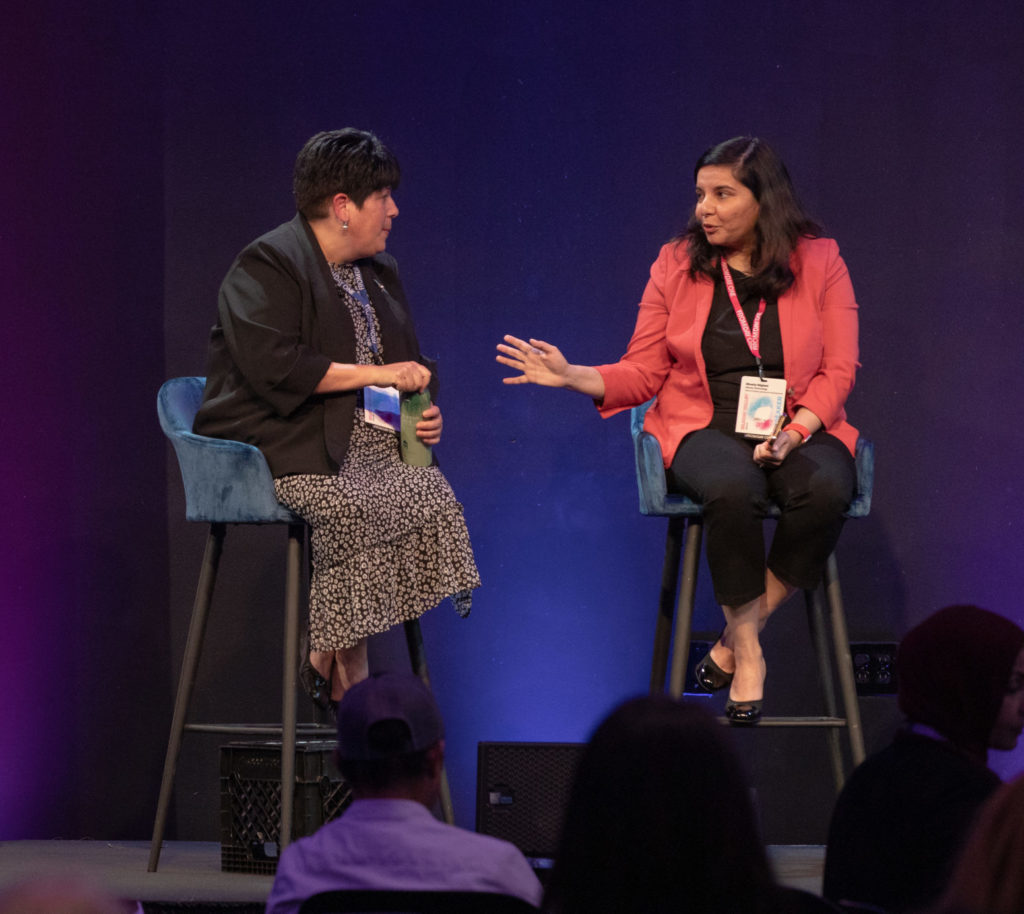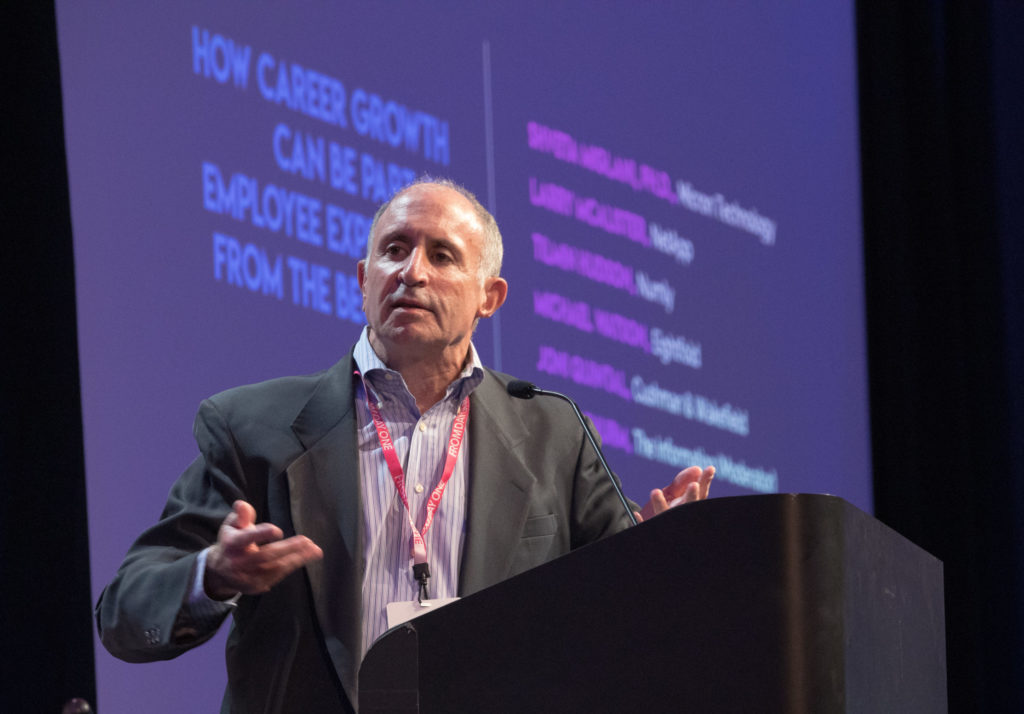‘Career Growth Can Be Even More Meaningful Than Salary’


Michael Watson came to hate the friendly farewells.
When Watson worked as a corporate recruiter, too often an employee he’d brought into the company seven or eight months earlier would stop by his cubicle to thank him warmly and say good-bye.
Good-bye? After less than a year?
“I just don't see a lot of career growth here,” the departing worker would explain. “It’s easier to find a job outside this organization than inside it.”
Like Watson, many HR professionals have come to realize that career growth opportunities–or lack thereof–are a key factor in retaining talented employees. “Career growth is something that can be even more meaningful than salary,” said Tilmin Hudson, VP of sales at Numly, a platform for coaching and networking.
Hudson and Watson, who is now head of global customer advocacy for Eightfold, an AI-powered talent platform, were among the five speakers who shared insights about career-growth opportunities and retention during a panel discussion at From Day One’s Silicon Valley conference in June.
Career Development From the Start
The panelists, moderated by Scott Thurm, senior editor of The Information, agreed that career growth opportunities should be built into employee experience from the moment of hire.

“They come in the door, we put them on a 30-60-90-day growth plan, and our learning and development team teaches four classes during their first week,” said Joni Quintal, head of learning and development at Cushman & Wakefield, the commercial real-estate company. “They know from the start there’s an internal team committed to their career development.”
Once employees are on board, managers can play an ongoing role of coach and career guide, but only if they are equipped to do that. “These days everyone wants a coach,” said Hudson. “Many managers think they’re coaching but they’re not really coaching. We really need to support managers in becoming coaches.”
Shveta Miglani, head of global learning and development at Micron Technology, said that all her firm’s newly appointed managers receive training that includes coaching and emotional-intelligence skills. “We have experienced managers teaching these sessions so they can actually talk about their own experiences, and participants aren’t just looking at a slideshow,” Miglani said.
Cross-pollination Within the Organization
The role of managers in fostering career growth goes beyond coaching. They must be willing to let go of prized employees who find advancement opportunities elsewhere in the company, even if it makes their own job harder in the short run. “The idea that you [as a manager] have to be a net exporter of talent is really important,” said Watson.
Companies can take a cue from the gig economy by offering workers a chance to try out new roles on a temporary, project-oriented basis. “Gig or project work helps test the waters, both from the leader side as well as from the individual employee perspective,” said Miglani.
Companies can also connect employees across departments as peer coaches. This offers a double benefit: both the coaching relationship and a glimpse of career options the employee might not otherwise have known about.
“You can have someone in marketing coaching someone in finance, or someone in finance helping someone in sales,” Hudson said. “Someone in another department may know how to do something and may be more innovative about it. So why not have that person help someone elsewhere in the company?”
Career Support for Underrepresented Groups
Companies should take extra steps to ensure that in-house advancement paths are visible to traditionally underrepresented groups like women and people of color.
Employee resource groups (ERGs), if supported by top leadership, can instill a sense of belonging and opportunity. So can diversity in the executive ranks. “As a minority woman, when a company hires me, the first thing I look at is who looks like me and who represents my values,” said Miglani. “When I don’t see that in leadership, the company can have the best programs, but I’m not going to stay.”

Managerial encouragement can be key in helping women employees envision new, challenging roles for themselves within an organization. As one panelist put it, many women don’t have the “fake it till you make it” mindset. Yet without taking risks, they may feel stagnant and leave.
“We women do this ‘imposter syndrome’ thing on ourselves when we’re thinking about our careers,” Hudson said. “We think we can’t pass those three tests or don’t have those three additional skills, so we don't apply.”
Career Mapping through A.I.
Employers today have exciting new tools to address the challenges of career growth, including artificial intelligence (AI) programs that can inform employees about internal career options they hadn’t even imagined.
“This is the Golden Age of HR technology," said Larry McAlister, VP for global talent with NetApp, a data-management company. “You can be a 25-year-old kid coming in to do a self-assessment, thinking, ‘I don't know where I’m gonna go.’ And the tool will tell you there are three ‘next jobs’ you could potentially take, based on what you like to do and what your skills are. It lets you visualize the next steps inside of your company. That’s mind-blowing.”
These tools can promote diversity by helping all employees—not just the confident or connected ones—find opportunities. “You could get recommendations for a job you might never have thought you’re qualified for,” McAlister said. “The technology tells you what your gaps are so you can easily close them. It breaks down barriers. People who feel like ‘I’m not with the in-group,’ or ‘I’m far away from headquarters,’ get a fair shot.”
Still, even the best technology needs a human touch—someone talking with individual employees and encouraging them. “Technology gets you to the human conversation faster and more informed, but it will never replace that human conversation,” McAlister said.
“If you don't have people who care,” said Watson, “none of the technology makes a difference.”
Ilana DeBare is a former workplace and small business reporter for the San Francisco Chronicle. Her novel “Shaken Loose” will be published in summer 2023.
The From Day One Newsletter is a monthly roundup of articles, features, and editorials on innovative ways for companies to forge stronger relationships with their employees, customers, and communities.